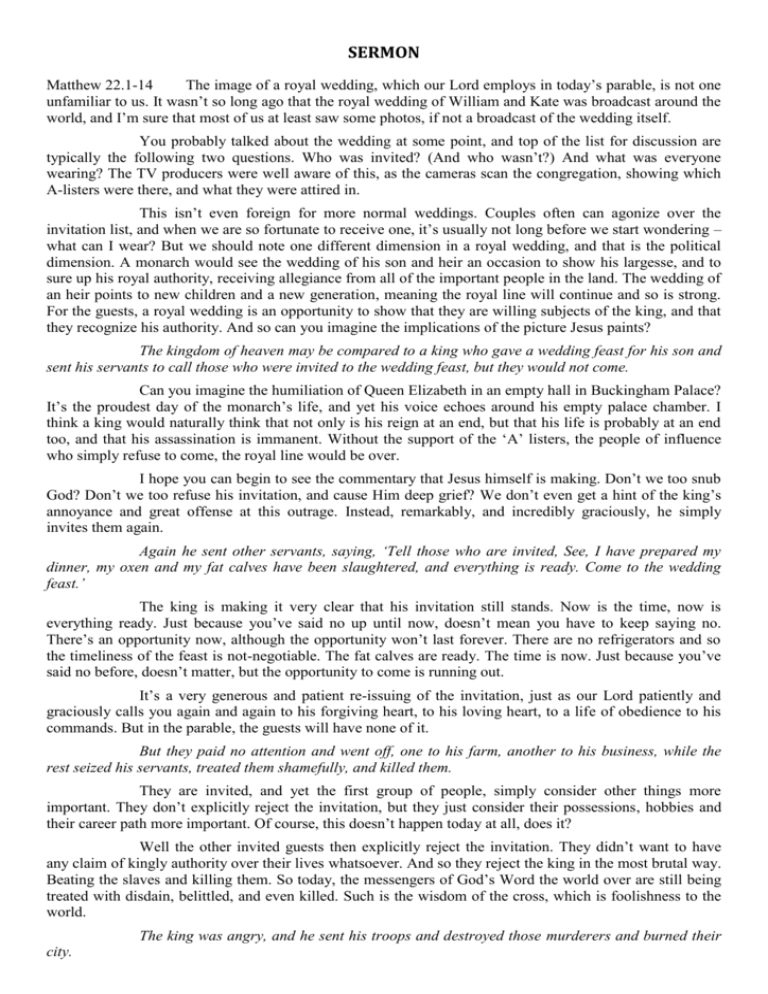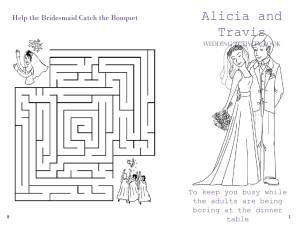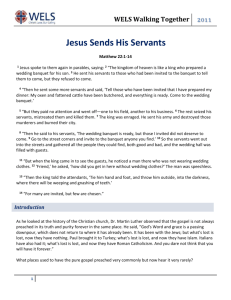SERMON 14-10-12 Matthew 22.1-14
advertisement

SERMON Matthew 22.1-14 The image of a royal wedding, which our Lord employs in today’s parable, is not one unfamiliar to us. It wasn’t so long ago that the royal wedding of William and Kate was broadcast around the world, and I’m sure that most of us at least saw some photos, if not a broadcast of the wedding itself. You probably talked about the wedding at some point, and top of the list for discussion are typically the following two questions. Who was invited? (And who wasn’t?) And what was everyone wearing? The TV producers were well aware of this, as the cameras scan the congregation, showing which A-listers were there, and what they were attired in. This isn’t even foreign for more normal weddings. Couples often can agonize over the invitation list, and when we are so fortunate to receive one, it’s usually not long before we start wondering – what can I wear? But we should note one different dimension in a royal wedding, and that is the political dimension. A monarch would see the wedding of his son and heir an occasion to show his largesse, and to sure up his royal authority, receiving allegiance from all of the important people in the land. The wedding of an heir points to new children and a new generation, meaning the royal line will continue and so is strong. For the guests, a royal wedding is an opportunity to show that they are willing subjects of the king, and that they recognize his authority. And so can you imagine the implications of the picture Jesus paints? The kingdom of heaven may be compared to a king who gave a wedding feast for his son and sent his servants to call those who were invited to the wedding feast, but they would not come. Can you imagine the humiliation of Queen Elizabeth in an empty hall in Buckingham Palace? It’s the proudest day of the monarch’s life, and yet his voice echoes around his empty palace chamber. I think a king would naturally think that not only is his reign at an end, but that his life is probably at an end too, and that his assassination is immanent. Without the support of the ‘A’ listers, the people of influence who simply refuse to come, the royal line would be over. I hope you can begin to see the commentary that Jesus himself is making. Don’t we too snub God? Don’t we too refuse his invitation, and cause Him deep grief? We don’t even get a hint of the king’s annoyance and great offense at this outrage. Instead, remarkably, and incredibly graciously, he simply invites them again. Again he sent other servants, saying, ‘Tell those who are invited, See, I have prepared my dinner, my oxen and my fat calves have been slaughtered, and everything is ready. Come to the wedding feast.’ The king is making it very clear that his invitation still stands. Now is the time, now is everything ready. Just because you’ve said no up until now, doesn’t mean you have to keep saying no. There’s an opportunity now, although the opportunity won’t last forever. There are no refrigerators and so the timeliness of the feast is not-negotiable. The fat calves are ready. The time is now. Just because you’ve said no before, doesn’t matter, but the opportunity to come is running out. It’s a very generous and patient re-issuing of the invitation, just as our Lord patiently and graciously calls you again and again to his forgiving heart, to his loving heart, to a life of obedience to his commands. But in the parable, the guests will have none of it. But they paid no attention and went off, one to his farm, another to his business, while the rest seized his servants, treated them shamefully, and killed them. They are invited, and yet the first group of people, simply consider other things more important. They don’t explicitly reject the invitation, but they just consider their possessions, hobbies and their career path more important. Of course, this doesn’t happen today at all, does it? Well the other invited guests then explicitly reject the invitation. They didn’t want to have any claim of kingly authority over their lives whatsoever. And so they reject the king in the most brutal way. Beating the slaves and killing them. So today, the messengers of God’s Word the world over are still being treated with disdain, belittled, and even killed. Such is the wisdom of the cross, which is foolishness to the world. The king was angry, and he sent his troops and destroyed those murderers and burned their city. These people had done great acts of wickedness, and now they face the just judgement of the king. Jesus doesn’t water this down. He puts it very simply for us to hear it. Our Lord’s authority over us is real. His call and invitation is real. He’s right to call us into His kingdom, and our rejection of His right authority over us comes at a price. Then he said to his servants, ‘The wedding feast is ready, but those invited were not worthy. Go therefore to the main roads and invite to the wedding feast as many as you find.’ And those servants went out into the roads and gathered all whom they found, both bad and good. So the wedding hall was filled with guests. It’s a wonderful picture of the limitless invitation. Everyone is called in to the royal wedding banquet. The good, as you might expect, but Jesus also makes it clear that the bad are there as well – those who have no claim to be there, those who perhaps don’t deserve to be there. Well, they’re invited too. ‘Everyone come in, because the celebration for my son must be enjoyed.’ The picture is of the teeming masses having a great time. In some ways we could expect the parable to end here. The question of ‘who is invited?’ has been resolved with an invitation being extended to all people, no matter who they are, no matter what they’ve done. And yet there’s a second wedding question. What are they wearing? But when the king came in to look at the guests, he saw there a man who had no wedding garment. And he said to him, ‘Friend, how did you get in here without a wedding garment?’ And he was speechless. Then the king said to the attendants, ‘Bind him hand and foot and cast him into the outer darkness.’ ‘In that place there will be weeping and gnashing of teeth.’ For many are called but few are chosen. What is the wedding robe? Christians have thought different things. Some early church fathers said the robe is the life of holiness. Augustine said it was the life of love. Luther said it was the life of faith active in love. All of these have something going for them. St Paul urges us to walk and live in a manner worthy of the calling or invitation that we’ve received (Ephesians 4.1). But the real point is that when the man was asked, in a friendly manner, how he got in without a robe, he was speechless. He doesn’t say, ‘I couldn’t afford one’ or ‘I had one, but it got torn on the way’. He has no excuse. The implication is that he could have turned up in a wedding robe, but he would not. He could respond to the invitation, but not appropriately, as the occasion demanded. Do we always clothe ourselves in humility and love? Could not God also ask us why we have not responded to his invitation appropriately? Of course, but may He never find us speechless. By the Holy Spirit we can always ask, as we do again today, to have mercy on us, and to give us a new start. As Psalm 32 declares: ‘When I kept silent, my bones wasted away…but then I said, ‘I will confess my transgressions to the Lord,’ and you forgave the iniquity of my sin.’ And, finally, when it comes to clothing ourselves before God, none of you are without the Godly gift of your baptism. This is what Martin Luther says in the Large Catechism on baptism. ‘All Christians should regard their baptism as daily clothing that they should wear all the time.’ Baptism provides the clothing for us, for life in the great wedding banquet of the church and the life of the world to come. Do you want to be clothed appropriately? Start with your baptism, Luther says. Every day they ‘should keep on practicing faith and its fruits so as to stifle the old person, and to grow up in the new.’ There’s an old way of life, pre-baptism. And then a new way of life, the baptized life, where we put on the clothing of Christ, and then living out this in our life – of prayer, of listening to God’s Word, of receiving the sacrament, of loving others according to God’s commands, and loving God. ‘For, if we want to be Christians, we have to practice those deeds that make us Christians. If anyone falls away’, they should give up? No. They “should return. Just as Christ, the mercy-seat, doesn’t leave us, or prevent us from returning to him, even though we sin, so all his treasures and gifts last.” What’s interesting is that we hear nothing about the resulting feast in our text. It’s left open, because the story continues today. You have been called, you have come to the feast, you have been clothed in Christ’s righteousness, your sins have been forgiven, and so today we celebrate the completion of the parable, the great feast. Preached on 12 October 2014 at St Paul’s Lutheran Church, Grovedale by Pastor Tom Pietsch









